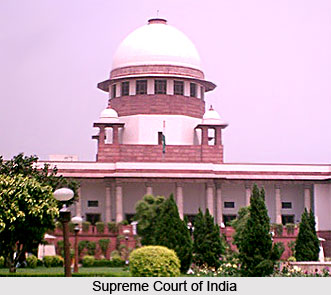Ministry of Law and Justice is the oldest limb of the Government of India dating back to 1833 when the Charter Act 1833 was enacted by the British Parliament. The various departments of the Ministry along with their functions are discussed below.
 Department of Legal Affairs (Vidhi Karya Vibhag)
Department of Legal Affairs (Vidhi Karya Vibhag)
The Department of legal affairs is responsible for giving advice to Ministries on legal matters including interpretation of the Constitution and the laws, conveyancing and engagement of counsel to appear on behalf of the Union of India in the High Courts and subordinate courts where the Union of India is a party. It has to see to the conduct of cases in the Supreme Court and the High Courts on behalf of the Central Government and on behalf of the Governments of States participating in the Central Agency Scheme. Reciprocal arrangements with foreign countries for the service of summons in civil suits, for the execution of decrees of Civil Courts, for the enforcement of maintenance orders, and for the administration of the estates of foreigners dying in India intestate are made by the Department of legal affairs. It also sees to the authorization of officers to execute contracts and assurances and of property on behalf of the President under Article 299(1) of the Constitution, and authorization of officers to sign and verify plaints or written statements in suits by or against the Central Government. The Department is responsible for Indian Legal Service, Treaties and agreements with foreign countries in matters of civil law, Law Commission, Legal Profession including the Advocates Act, 1961 (25 of 1961) and persons entitled to practice before High Courts, enlargement of the jurisdiction of Supreme Court and the conferring thereon of further powers; persons entitled to practice before the Supreme Court; references to the Supreme Court under Article 143 of the Constitution of India, administration of the Notaries Act, 1952 (53 of 1952), income-tax Appellate Tribunal. It also provides legal aid to the poor.
Legislative Department (Vidhayee Vibhag)
The Legislative Department is responsible for the drafting of Bills, including the business of the Draftsmen in Select Committees, drafting and promulgation of Ordinances and Regulations; enactment of State Acts as President`s Acts whenever required; scrutiny of Statutory Rules and Orders (except notifications under clause (a) of section 3, section 3A and section 3D, of the National Highways Act, 1956 (48 of 1956). Apart from this it is responsible for - Constitution Orders; notifications for bringing into force Constitution (Amendment) Acts; Publication of Central Acts, Ordinance and Regulations; Publication of authorised translations in Hindi of Central Acts, Ordinances, Orders, Rules, Regulations and bye-laws referred to in section 5(1) of the Official Languages Act, 1963 (19 of 1963); Compilation and publication of unrepealed Central Acts, Ordinances and Regulations of general statutory Rules and Orders, and other similar publications; Elections to Parliament, to the Legislatures of States, to the Offices of the President and Vice-President; and the Election Commission; Preparation and publication of standard legal terminology for use, as far as possible, in all official languages; Preparation of authoritative texts in Hindi of all Central Acts and of Ordinances promulgated and Regulations made by the President and of all rules, regulations and orders made by the Central Government under such Acts, Ordinances and Regulations; Making arrangements for the translation into official languages of the States of Central Acts and of Ordinances promulgated and Regulations made by the President and for the translation of all State Acts and Ordinances into Hindi if the texts of such Acts or Ordinance are in a language other than Hindi; Publication of law books and law journals in Hindi. It is also responsible for the subjects falling within list III of the Seventh Schedule to the Constitution.
Department of Justice (Nyaya Vibhag)
The Department of Justice is responsible for the appointment, resignation and removal of the Chief Justice of India and Judges of the Supreme Court of India as well as the Chief Justice and Judges of High Courts in States; their salaries, rights in respect of leave of absence (including leave allowances), pensions and travelling allowances. It also sees to the appointment of Judicial Commissioners and Judicial officers in Union Territories. Constitution and organisation (excluding jurisdiction and powers) of the High Courts and Supreme Court (but including contempt of such Court) and the fees taken therein is also seen to by the department of Justice. Apart from all these, the Department of Justice deals with the administration of justice and constitution and organisation of courts in the Union Territories and fees taken in such courts; court fees and Stamp duties in the Union Territories; creation of all India Judicial Service; conditions of service of District Judges and other Members of Higher Judicial Service of Union Territories and the extension of the Jurisdiction of a High Court to a Union Territory or exclusion of a Union Territory from the Jurisdiction of a High Court.




















